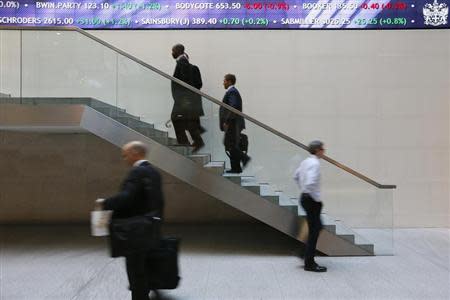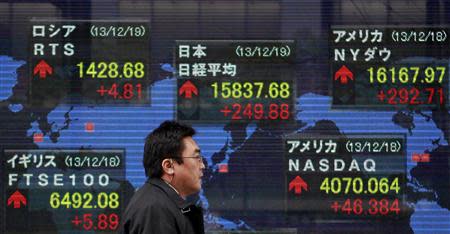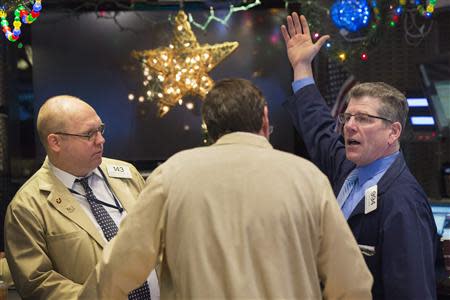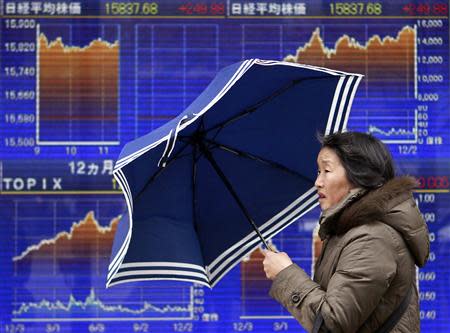Japan shares look to end bumper year on strong note
By Wayne Cole SYDNEY (Reuters) - Asian markets looked to run out the year with a flourish on Monday, with Japanese shares again set to lead the way as the yen skidded to fresh lows for a third straight session. Nikkei futures were pointing to a firm start for the cash index, <.N225> which notched up an eight straight session of gains on Friday in its longest such streak since March. The market is closed from Tuesday to Friday inclusive. The major U.S. stock indexes <.DJI> <.SPX> ended Friday flat for the session but still up between 1.3 and 1.6 percent for the week. The MSCI World Index <.MIDW00000PUS> added 0.4 percent on Friday to be up nearly 20 percent for the year. Australian stocks added 0.5 percent <.AXJO> and were on track to show a gain of 15 percent for the year. Much of Asia, however, has underperformed, in part due to investors shifting funds from emerging markets and into Europe and the United States. As a result, MSCI's broadest index of Asia-Pacific shares outside Japan <.MIAPJ0000PUS> is almost unchanged for the year. In stark contrast, Japan's Nikkei has risen almost 56 percent in 2013, its best annual performance since 1972, urged on by aggressive monetary and fiscal stimulus. There were more promising signs for the economy when the Asahi newspaper reported Japan's most influential business lobby has agreed to encourage its members to raise workers' base pay for the first time in six years. Many economists say an increase in base pay is essential to Prime Minister Shinzo Abe's pledge to end 15 years of deflation and to help the Bank of Japan meet its 2 percent inflation target. Aiding the economy has been the fall in the yen this year, which has left it at five-year trough against the dollar and euro. The dollar was up at 105.32 yen on Monday after reaching a fresh peak at 105.37. The yen posted its ninth consecutive week of falls against the dollar, the longest such period since 1974. The euro was also firm at 144.82 yen, having been as far as 145.67 yen on Friday. Thin year-end conditions made for some wild moves, with the euro vaulting as high as $1.3892 on Friday before falling back. On Monday, the single currency was somewhat calmer at $1.3753 with offers crowded in the $1.3810/35 area. The single currency could find further support from comments by European Central Bank President Mario Draghi that he saw no urgent need to cut interest rates again and no signs of deflation. Less positive was news Italy's third-biggest bank, Monte dei Paschi di Siena, was forced to delay a vital 3 billion euro ($4.1 billion) share sale because of shareholder opposition, plunging its turnaround plan into uncertainty. The world's oldest bank needs to tap investors for cash to pay back state aid and avert nationalization. Underpinning both the dollar and euro have been widening yield premiums over Japanese debt. Yields on the U.S. benchmark 10-year Treasury note have climbed to their highest in more than two years at 3.02 percent. The comparable Japanese yield is at just 0.715 percent. Analysts at RBS note that yields on the 30 year Treasury bond were approaching a hugely important level at 4.05 percent, which marks the top of a bull channel going back two decades. A breach there would be viewed as very bearish for bonds. In commodity markets, London copper was up at its highest level in four months, with signs of economic revival in Asia and the United States burnishing the demand outlook for industrial metals. Gold added a couple of dollars to $1,215, but was still on track for its biggest annual loss in three decades. Brent crude oil was 2 cents lower at $112.16 a barrel, while U.S. light sweet crude eased back 13 cents to $100.19 a barrel. (Editing by John Mair)




